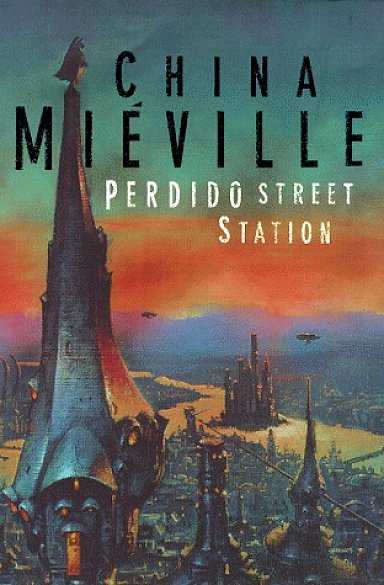Kindle Surprise: Perdido Street Station, by China Miéville
“I do not dream, der Grimnebulin. I am a calculating machine that has calculated how to think. I do not dream. I have no neuroses, no hidden depths. My consciousness is a growing function of my processing power, not the baroque thing that sprouts from your mind, with its hidden rooms in attics and cellars.”
Almost bailed on this one quite early. I had qualms going in based on my presearch – that’s research before reading. Basically, I had several books by the author, and wanted to find out which one was his first book, but also discovered the author stood for some fringe left-wing group in the 2001 General Election. Oh-oh: set “political soapbox threat level” to orange. Then, it opened with a prologue off densely obscure descriptive passages, followed by a first chapter that ends with a kinda graphic description of a sexual encounter between the hero and his insectoid lover. [Well, it’s perhaps not THAT graphic, but the concept is easily far enough out there, to be disturbing]. If I’d realized at the time that the book was 867 pages long, I might have skipped it too. Fortunately, the Kindle does not care for such things: all books look the same, regardless of their length.
I say, “fortunately,” since even though this took about six months to get through, read almost entirely on my 15-minute break at work, it’s a wonderfully inventive piece. Even my political fears were largely unfounded: while depicting what could be described as a police state, this is a minor aspect, and actually seems a fairly high-functioning regime. It’s set in the world of Bas-Rag, and in particular the city of New Crobuzon, where a multitude of races more or less co-exist. As well as the insectoid Khepri, you have the avian Garuda, the Cactacae (take a guess), the aquatic Vodyanoi, and so on. Science and magic are both in play, converging in a kind of occult steampunk known as “crisis energy”, which the hero Isaac Dan der Grimnebulin researches in his shared warehouse.
He is commissioned by a Garuda, Yagharek, who has lost his wings, and wants Isaac to provide an artificial alternative. Following a fairly complex set of incidents, doing so unleashes a plague on the city, in the form of a pack of slake moths – insects that suck the minds of their victims dry, leaving them drooling idiots, and which operate across multiple dimensions, making them almost impossible to kill. Oh, and if you look at them, you’re toast, as their wings form patterns that instantly hypnotize any viewer – no saving throw. Taking them down before they breed will require Isaac to form, and handle, a very shaky alliance between creatures, even more bizarre than those already described.
It becomes easy to understand why the author needs 867 pages for this. Part of it is his desire to construct a full world, so he includes a fair amount of stuff that’s not strictly necessary to the plot – politics, religions, etc. – which helps flesh out the bare bones. And you can multiply all those aspects by each of the species involved, with all the description that entails, although it never feels like pointless padding, Miéville doing a good job of mixing it well with sequences that move the plot forward. The results are positively cinematic, and I’d love to see this as a film, even if that would likely take a couple of hundred million to do it justice.
On the other hand, even beyond a massive budget, there are aspects here which would be very difficult to translate; yet removing them would undeniably weaken the effectiveness of the work as a whole. One character vanishes in the second-half, then returns, and it’s hardly a happy ending. And Miéville also pulls a switch very late on, with a reveal concerning the nature of another character – arguably, the most “heroic” in the entire book – that causes both us and the other participants to re-evaluate their entire relationship to that entity. If it works well on the printed page, the result would be almost impossible to pull off on the screen, since it’s so much of a deviation from cinematic structure.
I was somewhat annoyed by some of the pretentious little flourishes, such as persisting in spelling it “chymical”, and never using a two-syllable word when a five-syllable one can be located in his thesaurus. Miéville’s efforts to explain the “crisis engine,” a device which plays a key role in the plot, were also a dismal failure, descending into a mire of tedious pseudo-occult philosophigobbledygook that was completely unenlightening. However, you can’t expect a book of this mammoth size to exist without a few weak spots, and the positives, such as the battles against the slake moths, are page-turners of the highest order. If you’re looking for a richly-detailed work of imagination, with as much effort put into the setting as its plot and characters, this comes highly recommended.
“Old stories would tell how Weavers would kill each other over aesthetic disagreements, such as whether it was prettier to destroy an army of a thousand men or to leave it be, or whether a particular dandelion should or should not be plucked. For a Weaver, to think was to think aesthetically. To act–to Weave–was to bring about more pleasing patterns. They did not eat physical food: they seemed to subsist on the appreciation of beauty.”
